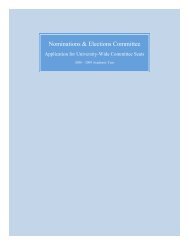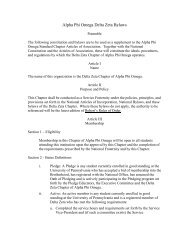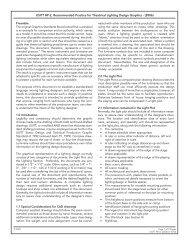Penn Philosophical Perspectives - University of Pennsylvania
Penn Philosophical Perspectives - University of Pennsylvania
Penn Philosophical Perspectives - University of Pennsylvania
- No tags were found...
You also want an ePaper? Increase the reach of your titles
YUMPU automatically turns print PDFs into web optimized ePapers that Google loves.
assessment <strong>of</strong> Jones’ blameworthiness. I must concede that inorder to construct a valid argument that the bird was morallyirrelevant, certain assumptions must be made about moral responsibility,and like all concepts, moral responsibility meanswhatever one wants it to mean. That is, there is no good reasonwhy moral responsibility could not mean fault for bringingabout an endresponsibility is more consistent with commonly held beliefs,and is more useful as a tool for ascribing blame and praise.ento mean fault for intendingto bring about an end (intentionhere is the bringing about <strong>of</strong> anon this account, Jones and Smithare equally morally responsible.same end, and it was only dueto chance that a bird intercepted <strong>of</strong> the three principles, that (1)agents are morally responsiblefor their intentions. cipleis a necessary axiom, ins<strong>of</strong>aras this notion <strong>of</strong> moral responsibility is necessary to delineatejudgments <strong>of</strong> actions from judgments on states <strong>of</strong> affairs. Hur-Katrina was not morally responsible for destroying parts <strong>of</strong>wind currents in order to produce Hurricane Katrina, he wouldrologistbring about an end, but only the meteorologist intendsmoral responsibility is ultimately arbitrary, it better accommodatesour intuitions about the proper subjects <strong>of</strong> praise andalresponsibility that luck in matters <strong>of</strong> consequences is morallyagents are responsible for their intention to bring about a consequence.January 2010<strong>Penn</strong> <strong>Philosophical</strong> <strong>Perspectives</strong> come from? Surelycircumstances, previous experiences, upbringing, and perhapsnot choose their parents or the conditions <strong>of</strong> their childhood,and if one chooses the circumstances <strong>of</strong> a decision or can re-circumstances which were, in turn, due to previous circum-said about whether intention is exclusively determined by luck;some will maintain the existence <strong>of</strong> free will <strong>of</strong> a sort that cantionis at least partially based on luck. It is uncontroversial thathow one is raised at least contributes to one’s decisions, and itis at least the case that circumstances preclude the formation <strong>of</strong>certain intentions. So we have principle (2), that agents’ intentionsdepend on luck.If (1) agents are morally responsible for their intentions, and if(2) agents’ intentions depend on luck, then it must be the casethat agents are morally responsible for that which depends onluck. In other words, it must be false this argument makes no claims about the truth <strong>of</strong> premises (1)and (2). It is a conditional pro<strong>of</strong>; if it were the case that (1) and(2), thenany two <strong>of</strong> these principles willmay choose, so to speak, whichpremise to abandon. I believethat the best case can be made forPeter Strawson ceptingthat agents can be responsiblefor that which dependsrelevant to moral responsibility.minemoral responsibility (1) anddepend on luck (2). I now want toshow how individuals can be morallyresponsible for their intentions, even if the formation <strong>of</strong>their intentions came about by luck.Say that Tim has a genetic disposition to become angryand overreact, and he was raised in an environment that hadbred criminal tendencies. If Tim murders someone, we can takederdepends on luck. This would be consistent with the analysisthus far. In contrast, we could excuse Tim on the grounds thathe did not control his upbringing and genes. However, everyintention can be traced to some factor beyond an agent’s con-concept <strong>of</strong> moral responsibility.So it follows from one feature <strong>of</strong> moral responsibility(that it must be possible to be morally responsible) that Tim’smoral responsibility must depend on luck. It follows from anotherfeature <strong>of</strong> moral responsibility (that moral responsibilitymust track intentions) that Jones’ moral responsibility does notdepend on luck. How can moral responsibility only sometimesdepend on luck? The following principle will reconcile the casesand give a possible maxim according to which moral responsibilitywill only sometimes depend on luck: luck is morally relevantonly when it occurs prior to intention. There are, I think,compelling reasons to reject both the claim that luck is alwaysmorally relevant and that luck is never morally relevant. If I amright, and if intention <strong>of</strong>fers a demarcation for luck’s moral relevance,then the notion <strong>of</strong> agency will remain intact. This is unsurprisingbecause intention is fundamental to agency; indeed,should not always be morally relevant and for why luck shouldnot be declared never morally relevant.Luck should not always be morally relevant because20
















